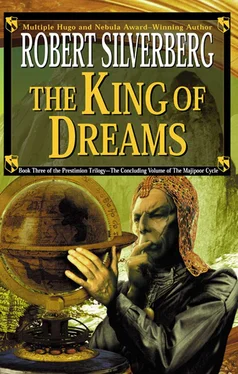“You can be sure that I will.”
“May I ask if it is your plan to appoint a High Magus when your reign officially begins? Not that I am applying for the job. You should know, if you are not already aware of the fact, that the new Pontifex has asked me to accompany him to the Labyrinth once the ceremonies of your coronation are behind us.”
Dekkeret nodded. “I expected as much. As for a new High Magus, I have to tell you, Maundigand-Klimd, that I haven’t given the matter a bit of thought. My present feeling is that I don’t have any need of one.”
“Because you would regard whatever he told you as essentially useless?”
“Essentially, yes.”
“It is your choice to make,” said Maundigand-Klimd, and from his tone it was clear that the matter was one of utter indifference to him. “However, for the time being there still is a High Magus in the Coronal’s service, and I feel obliged to inform the new Coronal that I have had a perplexing revelation that might have some bearing on his reign. The former Lord Prestimion advises me that it would be appropriate for me to bring this revelation to your attention.”
“Ah,” said Dekkeret. “I see.”
“Of course, if your lordship prefers not to—”
“No,” Dekkeret said. “If Prestimion thinks I should hear it, by all means share it with me.”
“Very well. What I have done is cast an oracle for the outset of your reign. The omens, I regret to say, were somewhat dark and inauspicious.”
Dekkeret met that with a smile. “I’m grateful, then, for my lack of belief in the mantic arts. It’s easier to handle bad news when you don’t have much faith in its substance.”
“Precisely so, my lord.”
“Can you be more specific about these dark omens, though?”
“Unfortunately, no. I know my own limitations. Everything was shrouded in a haze of ambiguities. Nothing had real clarity. I picked up only a sense of strife ahead, of refusals to offer allegiance, of civil disobedience.”
“You saw no faces? You heard no names named?”
“These visions do not function on such a literal level.”
“I confess I can’t see much value in a prediction so murky that it doesn’t actually predict anything,” said Dekkeret. He was growing impatient with this now.
“Agreed, my lord. My visions are highly subjective: intuitions, impressions, sensations of the most subtle kind, glimpses of probability, rather than concrete details. But you would do well to be on guard, all the same, against unexpected reversals of circumstance.”
“My historical studies tell me that a wise Coronal should always do just that, with or without the advice of mages to guide him. But I thank you for your counsel.” Dekkeret moved toward the door.
“There was,” said Maundigand-Klimd, before Dekkeret had quite managed to take his leave, “just one aspect of my vision that was clear enough for me to be able to describe it to you in any meaningful way. It involved the Powers of the Realm, who had gathered at the Castle for a certain ceremony of high ritual importance. I sensed their auras, all clustered around the Confalume Throne.”
“Yes,” Dekkeret said. “We do have all three Powers at the Castle just now: my mother, and Prestimion, and I. And what exactly were we doing in this dream of yours, the three of us?”
“There were four auras, my lord.”
Dekkeret looked puzzledly at the magus. “Your dream misleads you, then. I know of only three Powers of the Realm.” He counted off on his fingers: “The Pontifex, the Coronal, the Lady of the Isle. It’s a division of authority that goes back thousands of years.”
“Unmistakably I felt a fourth aura, and it was the aura of a Power. A fourth Power, my lord.”
“Are you saying that a new usurper is about to proclaim himself? That we’re going to play out the Korsibar business all over again?”
From the Su-Suheris came the Su-Suheris equivalent of a shrug: a partial retraction of the forked column of his neck, a curling inward of his long-clawed six-fingered hands. “There was no evidence in my vision that favors such a possibility. Or that denies it, either.”
“Then how—”
“I have one other detail to add. The person who carried the aura of the fourth Power of the Realm carried also the imprint of a member of the Barjazid family.”
“What?”
“It was unmistakable, sir. I have not forgotten that you brought the man Venghenar Barjazid, and of course his son Dinitak, to the Castle as prisoners, though it was twenty years ago. The pattern of a Barjazid soul is extraordinarily distinctive.”
“So Dinitak’s going to be a Power!” cried Dekkeret, laughing. “How he’ll love to hear that!” The nonsensical revelation, coming at the climax of this lengthy and baffling conversation, struck him as wonderfully laughable. “Will he push me aside and make himself Coronal, do you think? Or is it the post of Lady of the Isle that he’s got his eye on?”
Nothing disturbed Maundigand-Klimd’s impenetrable gravity. “You give insufficient credence, lordship, to my statement that my visions are subjective. I would not say that the Barjazid who was cloaked in a Power’s majesty was your friend Dinitak, nor could I say that he was not. I can only tell you that I felt the Barjazid pattern. I caution you against too literal an interpretation of what I tell you.”
“There are other Barjazids, I suppose. Suvrael may still teem with them.”
“Yes. I remind you of the man Khaymak Barjazid, who not long ago attempted to enter Lord Prestimion’s service, but was turned away at the advice of his own nephew Dinitak.”
“Right. Venghenar’s brother—of course. He’s the one who’s going to be a Power, then, you think? It still makes no sense, Maundigand-Klimd!”
“Again I caution you, lordship, against seeking so literal an explanation. Obviously it’s absurd that there can be a fourth Power of the Realm, or that a member of the Barjazid clan could so much as aspire to that distinction. But my vision cannot be dismissed out of hand. It has symbolic meanings that at this point not even I can interpret. But one thing is clear: there will be trouble in the early part of your reign, my lord; and a Barjazid will be involved in it. More than that, I cannot say.”
“Are you still awake?” Fiorinda asked.
Teotas, beside her, muttered an affirmative. “What hour is it, anyway?”
“I don’t know. A very late one. What keeps you up?”
“Too much wine, I suppose,” he said. The pre-coronation banquet that evening had gone on and on, everybody carrying on like drunken roaring fools, Prestimion and Dekkeret side by side at the high table, Septach Melayn, Gialaurys, Dembitave, Navigorn, and half a dozen other members of the Council, everyone in a rare good humor. Abrigant had come up from Muldemar for the occasion, bringing with him ten cases of wine of a glorious vintage dating far back into the time of Lord Confalume, and doubtless all ten cases contained nothing but empty bottles now.
But it was an evasive answer. Teotas knew that the wine was not to blame for his wakefulness. He had had as much to drink as anybody, he supposed. The irony was that wine was wasted on him—and he a prince of Muldemar, a member of the family that made the finest wines in the world! He might just as well be drinking water. His intense, churning soul burned the alcohol as fast as it could enter him: it had no effect on him at all. He had never really been drunk in his life, never even pleasantly tipsy, and that was a heavy price to pay for being spared from hangovers as well.
What was bothering him, he knew, had nothing to do with last night’s debauchery. It was, in good part, uneasiness over the vastness of the changes that were about to come over his existence, now that Prestimion’s time as Coronal was over and his brother’s new life in the Labyrinth was about to commence.
Читать дальше












